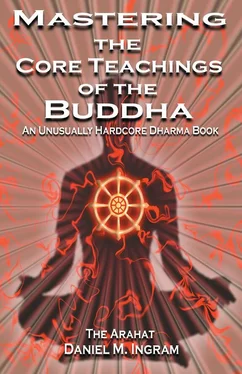Daniel Ingram - Mastering the Core Teachings of Buddha - An Unusually Hardcore Dharma Book
Здесь есть возможность читать онлайн «Daniel Ingram - Mastering the Core Teachings of Buddha - An Unusually Hardcore Dharma Book» весь текст электронной книги совершенно бесплатно (целиком полную версию без сокращений). В некоторых случаях можно слушать аудио, скачать через торрент в формате fb2 и присутствует краткое содержание. Год выпуска: 2009, ISBN: 2009, Издательство: Aeon Books, Жанр: Старинная литература, на русском языке. Описание произведения, (предисловие) а так же отзывы посетителей доступны на портале библиотеки ЛибКат.
- Название:Mastering the Core Teachings of Buddha - An Unusually Hardcore Dharma Book
- Автор:
- Издательство:Aeon Books
- Жанр:
- Год:2009
- ISBN:9781904658405
- Рейтинг книги:5 / 5. Голосов: 1
-
Избранное:Добавить в избранное
- Отзывы:
-
Ваша оценка:
- 100
- 1
- 2
- 3
- 4
- 5
Mastering the Core Teachings of Buddha - An Unusually Hardcore Dharma Book: краткое содержание, описание и аннотация
Предлагаем к чтению аннотацию, описание, краткое содержание или предисловие (зависит от того, что написал сам автор книги «Mastering the Core Teachings of Buddha - An Unusually Hardcore Dharma Book»). Если вы не нашли необходимую информацию о книге — напишите в комментариях, мы постараемся отыскать её.
Mastering the Core Teachings of Buddha - An Unusually Hardcore Dharma Book — читать онлайн бесплатно полную книгу (весь текст) целиком
Ниже представлен текст книги, разбитый по страницам. Система сохранения места последней прочитанной страницы, позволяет с удобством читать онлайн бесплатно книгу «Mastering the Core Teachings of Buddha - An Unusually Hardcore Dharma Book», без необходимости каждый раз заново искать на чём Вы остановились. Поставьте закладку, и сможете в любой момент перейти на страницу, на которой закончили чтение.
Интервал:
Закладка:
The problem comes for those who believe in God Free Zones, that is, those places where God is not. These tend to be people who believe in a limited, abstract God. Most people who believe in God have not taken the time to consider the question of whether or not they believe in God Free Zones or a limited God. In fact, most people who believe in God in the monotheistic sense would be offended by the notion that their God was somehow limited. However, if you question them about whether or not God is in their toilet paper or in a rock, or perhaps more specifically IS the toilet paper, and is the rock, is their weird popcorn fetish, is the annoying itch in their armpit, and actually is everything else, even most people who in theory believe in an omnipresent, unlimited, all-powerful God won’t go that far. This is too bad, because if they did, they would have a good working model for realizing that THIS IS IT, and so we are back to my original, simple, excellent premise and test for good models of awakening.
Here’s how this works: if you believe that you are trying to see God, and you believe that all creation is a manifestation not just created by 301
Models of the Stages of Enlightenment
God, but in fact IS GOD, they you are back to basic insight practices: seeing the sensate world exactly as it is, because there you will find ultimate reality, or “God”, if you want to call it that. When the center point is seen through by your careful investigation of all these sensations, or all the aspects of God, then all that is left is just all these sensations as before, that is, all this God. Thus, if one is willing to really believe in a omnipresent God, then by truly, deeply, directly perceiving all sensations to be just part of the causal, natural unfolding of what they label God, all the boundaries between what were self and other can be seen through, and the phenomenal world is left doing its thing, thus the practitioner realizes they always were part of God, in a sense, though these designations are merely terminological one way or the other.
Thus, the problem with God models typically is that people don’t take them far enough, because if they do they can get into something really good, though they could get their just as easily without them. All the other ideals that are involved in becoming God or seeing God are just more odd dreams and possible side effects of spiritual practice. I have a few friends who saw visions while on LSD in which “God” told them useful stuff, and this is fine, but this is back in the realm of the powers and has nothing to do with awakening and only a very limited amount to do with “God” in the ultimate sense.
THE PHYSICAL MODELS
On a completely different track we have the Physical Models, which tend to involve some kind of physical perfection or stylization. The old Theravada texts go to great lengths to list the 32 interesting physical qualities of the Buddha, such as having 40 teeth and arms so long that he could touch his knees without bending down. It is interesting how things change, as in our modern context that would make him look more to us like a dentally challenged Cro-Magnon than a spiritual superhero, but I digress.
Numerous pop culture sources make us associate interesting
physical qualities or ideals with spirituality, particularly yoga magazines and martial arts movies. There is not much more to say about these models other than they are amusing and completely inaccurate. We may imagine that somehow enlightenment involves some kind of physical health, or think that awakening or insight practice may cure 302
Models of the Stages of Enlightenment some illness, but I wouldn’t bank on anything like this at all. That said, my friends who regularly do practices like yoga and Tai Chi do tend to look good, and this only makes sense. However, this is not related to ultimate realizations except peripherally in that those practices involve mindfulness and if done well can lead to real insights.
THE RADIANCE MODELS
Related to the Physical Models are the Radiance Models, which tend to involve imagining that enlightened beings will have some kind of remarkable presence, usually involving radiating love, charisma, wisdom, peace or even physical light. A friend of mine used to joke about this by saying that people in Western Vipassana at the Insight Meditation Society thought that an arahat would be someone like Dipa Ma (a talented practitioner of vipassana and samatha who died an anagami by her own admission) but with light shining out of their ass.
This is a bit of an exaggeration, but it makes the point that these ideals are so ingrained in us from many traditions that it is hard to not imagine that enlightened beings must have something remarkable about them that you could feel or see.
Everyone knows that all saints have light coming out of their heads, as did Jesus. You have only to look to medieval paintings to confirm this. The stories of the Buddha are full of his marvelous presence. In fact, his very first interaction with a human after his awakening went something like this. The Buddha had gotten up after exploring the depths of his realization and abilities. He decided to go try to find his five companions who had been with him during his period of grave asceticism, and surveying the world with his psychic powers found they were at Benares. He took off walking down the road between Bodh Gaya and Gaya, and the first person the Buddha talked to after his awakening that wasn’t a god or a giant snake was the monk Upaka. I quote the Buddha as he tells the tale, as rendered in Bhikkhu Ñanamoli and Bhikkhu Bodhi’s The
Middle Length
Discourses of the Buddha ,
Sutta 26, as it is so priceless and such a wealth of information about the origin of these models and ideals:
[Upaka said] ‘Friend, your faculties are clear, the color of your skin is pure and bright. Under whom have you gone forth,
303
Models of the Stages of Enlightenment
friend? Who is your teacher? Whose Dhamma do you
profess?’
I [The Buddha] replied to the Ajivaka Upaka in the stanzas:
‘I am one who has transcended all, a knower of all,
Unsullied among all things, renouncing all,
By craving’s ceasing freed. Having known this all
For myself, to whom should I point as teacher?
I have no teacher, and one like me
Exists nowhere in all the world
With all its gods, because I have
No person for my counterpart.
I am the Accomplished One in the world
I am the Teacher Supreme.
I alone am a Fully Enlightened One
Whose fires are quenched and extinguished.
I go now to the city of Kasi
To set in motion the Wheel of Dhamma.
In a world that has become blind
I go to beat the drum of the Deathless.’
[Upaka replied] ‘By your claims friend, you ought to be the
Universal Victor.’
‘The victors are those like me
Who have won to destruction of taints.
I have vanquished all evil states,
Therefore, Upaka, I am a victor.’
The passage is remarkable in that it sets out a large number of criteria and specifics about what awakening means to the Buddha and to Buddhism in such a short space. Further, what is interesting is the 304
Models of the Stages of Enlightenment number of times the word “I” appears. In fact, “Buddha” means something like Awakened One, or “I am awake.” Thus, we see that the Buddha had no trouble talking about what he had done and who he was, nor did he have trouble thinking the thought “I”.
We note his remarkable presence and skin, and so have the first of the Buddhist Radiance Models and Physical Models. We note that he says he is superior to the Gods, which is sort of a God Model in and of itself, except one better. He describes being free of all the taints and evil states, which is a complex mix of Emotional and Psychological Models.
Читать дальшеИнтервал:
Закладка:
Похожие книги на «Mastering the Core Teachings of Buddha - An Unusually Hardcore Dharma Book»
Представляем Вашему вниманию похожие книги на «Mastering the Core Teachings of Buddha - An Unusually Hardcore Dharma Book» списком для выбора. Мы отобрали схожую по названию и смыслу литературу в надежде предоставить читателям больше вариантов отыскать новые, интересные, ещё непрочитанные произведения.
Обсуждение, отзывы о книге «Mastering the Core Teachings of Buddha - An Unusually Hardcore Dharma Book» и просто собственные мнения читателей. Оставьте ваши комментарии, напишите, что Вы думаете о произведении, его смысле или главных героях. Укажите что конкретно понравилось, а что нет, и почему Вы так считаете.












